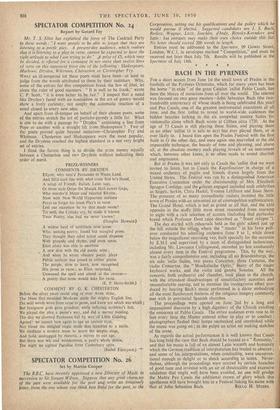BACH IN THE PYRENEES
FOR a short season from June 1st the small town of Prades in the foothills of the Pyrenees Orientales, which for many years has been the home " in exile " of the great Catalan 'cellist Pablo Casals, has
been the Mecca of musicians from all over the world. The interest was focused on two great masters—John' Sebastian Bach (the two- hundredth anniversary of whose death is being celebrated this year) and Pau Casals, one of the greatest instrumental executants of all time, and the first 'cellist to reveal to world-wide audiences the hidden beauties lurking in the six somewhat austere Suites for violoncello alone which Bach wrote at Cothen circa 1720. At the age of 73 Casals is still playing these Suites, and playing them as no other 'cellist (it is safe to say) has ever played them, or is ever likely to. I heard him open the Prades Festival with the first Suite in G the other day, and once again one marvelled at the old impeccable technique, the beauty of tone and phrasing, and above all, at the absolute mastery such playing reveals of an instrument which, between other knees, is so often made to sound churlish and ungracious.
But at Prades it was not only to Casals the 'cellist that we were invited to listen, but to Casals the Kapellmeister in charge of a mixed orchestra of pupils and friends drawn largely from the United States. The Festival was run by a distinguished American Executive Committee under the chairmanship of Mrs. Elizabeth Sprague Coolidge, and the soloists engaged included such celebrities as Szigeti, Serkin, Clara Haskil, Yvonne Lefebure and Isaac Stern. The presence of so many transatlantic visitors invested the little town of Prades with an unwonted air of cosmopolitan sophistication. The Grand Hotel, which is not as grand as all that, and the café opposite in the stuffy little main street resounded from morning to night with a rich selection of accents (including that particular brand which Professor Dent cnce described as " fluent refugee ").
The day started with rehearsals held in the girls' school just up the hill outside the villa. where the " master " in his fawn pull- over conducted his admiring orchestra from 9 to 1, while down below the magnificent recording van, built specially for the occasion by E.M.I. and supervised by a team of distinguished technicians, including Mr. Lawrance Collingwood, recorded no less assiduously almost every item in the Festival programme. This, by the way, was a fairly comprehensive one, including all six Brandenburgs, the six solo 'cello Suites, two piano Concertos, three Cantatas, the violin Concertos, the " Musikalische Opfer," many of the major keyboard works, and the violin and gamba Sonatas. All the concerts, both orchestral and chamber, took place in the church, with the attendant disadvantages of unsatisfactory acoustics and uncomfortable seating, not to mention the incongruous effect pro- duced by hearing Bach's music performed in a decor embodying all the most flamboyant features of the religious imagery commonly met with in provincial Spanish churches.
The proceedings were opened on June 2nd by a long and impassioned discourse by a high dignitary of the Church extolling the eminence of Pablo Casals. The entire audience even rose to its feet every time the Master entered either to play or to conduct ; photographers -flashed their lamps unchecked and unrebuked while the music was going on ; in the pulpit an artist sat making sketches of the scene.
As regards the actual performances it is well known that Casals has long held the view that Bach should be treated as a " Romantic," and that his music is full of an almost Latin warmth and humanity which the German tradition'of interpretation has tended to obscure ; and some of his interpretations, when conducting, were unconven- tional enough to delight or to shock according to tastes. Never- theless, although the proceedings were marred by certain breaches of good taste and invested with an air of theatricality and excessive adulation that might well have been avoided, no one will grudge the Maitre Pau Casals the additional crown of glory which this apotheosis will have brought him in a Festival linking his name with














































 Previous page
Previous page